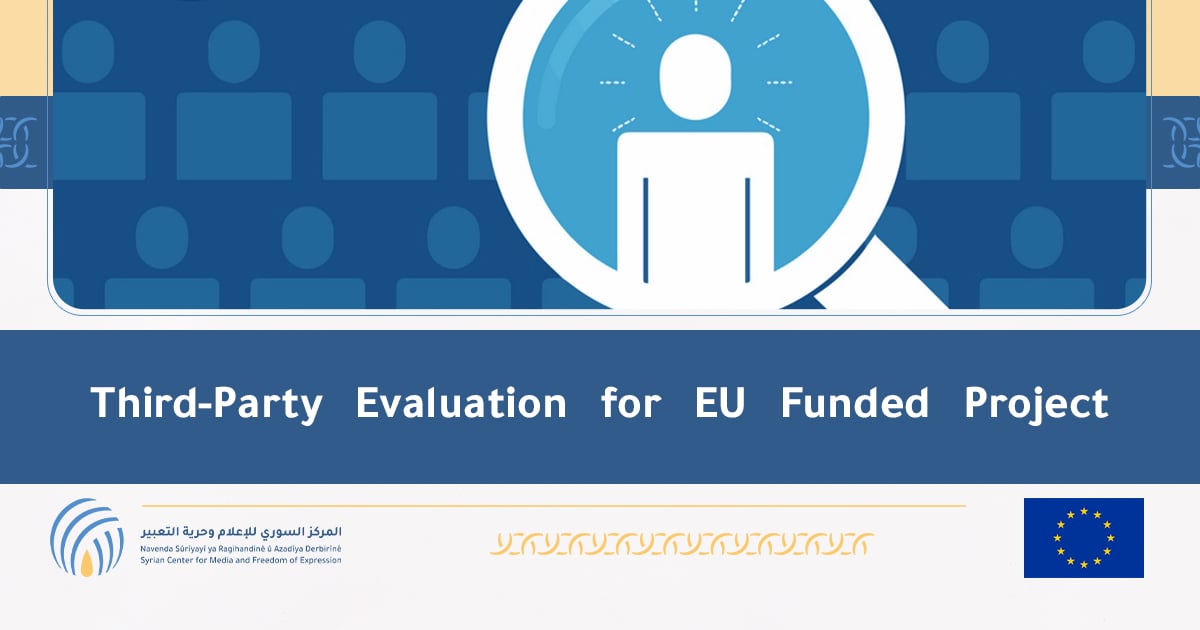Terms of Reference (ToR)
Third-Party Evaluation for EU Funded Project
Introduction
The Syrian Center for Media and Freedom of Expression (SCM) is an independent, non-governmental, non-profit civil society organization founded in 2004. It works to achieve justice, defend human rights, promote media freedom, support civil society, and encourage active citizenship. The center has gained expertise in combating impunity and promoting the rule of law. The center has held special consultative status with the United Nations Economic and Social Council since 2011. Its work focuses on documenting human rights violations and presenting legal cases to hold perpetrators accountable, strengthening the role of victims and their families, and supporting journalists, human rights defenders, and independent media to build democracy and support civil peace. The center has established a developed database to serve as a reference for transitional justice processes.
Background
The project “Empowering Survivors and Victims’ Families in Syria to Pursue Justice”, funded by the European Union, is being implemented in Syria, neighboring countries, and Europe from 1 January 2023 to November 2025.
The project aims to strengthen the capacity of survivors and families of victims of torture and enforced disappearance in Syria to play an active role in combating impunity, uncovering the truth, and advocating for reparations. It further seeks to ensure that their needs and demands are integrated into political discussions, recommendations, and policy development, thereby promoting a victim-centered approach within the Syrian justice process.
Scope of Work
The Third-Party Evaluation service provider shall be responsible for independently verifying the implementation of project activities as outlined in the approved Description of the Action. The service provider will assess the quality, relevance, timeliness, and effectiveness of project interventions, ensuring they align with the objectives, indicators, and targets specified. The service provider will collect both quantitative and qualitative data using appropriate tools such as field visits, structured interviews, focus groups, and document reviews. The service provider will also identify challenges, provide evidence-based recommendations, and report on the overall performance and compliance of the project with EU requirements.
General Objective:
To provide an independent and credible assessment that will:
- Verify that project activities are implemented as planned;
- Assess the achievement of intended results and the quality of deliverables;
- Assess and validate the final values for each indicator in the logical framework matrix (impact, outcomes, outputs);
- Evaluate the effectiveness, efficiency, relevance, and sustainability of the project’s implementation and resource use;
- Identify key lessons learned and provide evidence-based insights to inform future programming and strategic decision-making.
Specific Objectives:
- Verify the alignment of implemented activities with the project design, plans, and contractual agreements;
- Evaluate the short-term and potential longer-term impacts of the interventions on targeted beneficiaries;
- Provide practical and actionable recommendations to improve future project design, delivery, and results;
- Strengthen accountability and transparency to both donors and beneficiaries.
Key Evaluation Questions:
- Were activities implemented as planned in terms of timing, scope, and quality?
- Were any deviations justified and documented?
- To what extent have the activities contributed to achieving the intended outputs, outcomes, and impacts?
- Were financial, human, and material resources used optimally to achieve results?
- To what extent were the interventions appropriate to the needs and priorities of the target groups?
- Are the benefits of the project likely to be sustained after its completion?
- What major challenges or obstacles affected implementation?
- How effectively were these addressed?
- What lessons can be drawn to inform similar future projects?
- What opportunities exist for improving future programming?
Methodology:
The consultant/firm is expected to:
- Review key project documents (agreements, progress reports, operational plans).
- Conduct interviews with key stakeholders, beneficiaries, and project staff.
- Carry out field visits (where feasible) for on-site data collection.
- Apply mixed methods (qualitative and quantitative tools such as surveys, FGDs, case studies).
- Ensure ethical standards are met (informed consent, confidentiality).
Expected Deliverables:
- Inception report: including a detailed work plan and methodology.
- Final evaluation report: with findings, analysis, conclusions, and recommendations.
- Presentation of findings.
Required Qualifications:
Proven experience in conducting external evaluations of donor-funded projects (preferably EU-funded).
Fluency in English and Levantine Arabic (spoken and written) is required, including the ability to draft professional documents and communicate effectively in both languages.
Strong analytical skills and experience with mixed-methods approaches.
Proven experience working with conflict-affected populations and a strong understanding of the Syrian context.
Excellent reporting and recommendation drafting skills.
Duration of the Assignment:
Two months (November–December 2025)
Submission Deadline:
31 July 2025
Proposal Submission
Interested consultants/firms should submit the following documents to [email protected]:
- A technical proposal detailing methodology, work plan, and timeline.
- A detailed financial proposal.
- CV(s) of the proposed team member(s).
- Samples of similar previous work (if possible).
- Applicants must submit two recent references who can speak to their qualifications and past performance in similar roles.





